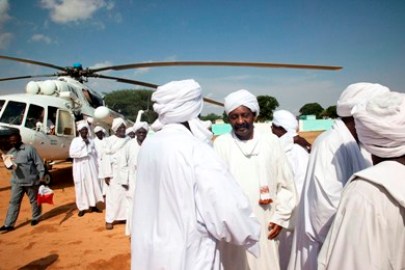LJM accuses government troops of involvement in tribal clashes in East Darfur
August 23, 2014 (KHARTOUM) – The head of the Liberation and Justice Movement (LJM) in East Darfur state, Hussein al-Safi, said that his movement’s fighters have interfered to protect civilians in ongoing clashes between the Rizaigat and Ma’alia tribes in the Um Rakubah area, 25km east of the state’s capital, El Daein.

“LJM troops would not relent to respond to any criminal attack against residents of the [East Darfur] state,” he said.
The former rebel group LJM joined the government following the signing of the Doha Document for Peace in Darfur (DDPD) in mid-July 2011.Its chairman, Tijani al-Sissi heads the Darfur Regional Authority.
Last week, fighting erupted between the two tribes last week after the theft of livestock belonging to Ma’alia people in Abu Rakubah area which is part of Abu Karnaka county, East Darfur.
The deputy governor of East Darfur state, Ahmed Kibir, told Sudan Tribune that police records show that 174 people were killed and 223 other wounded in the fighting between the two Arab tribes.
Al-Safi held ministers of defence and interior responsible for the involvement of the Rizeigat affiliates in the Sudanese army and police in the clashes and the use of government’s weapons and vehicles which multiplied the number of victims.
The interior minister, Ismat Abdel-Mageed, on Thursday had denied involvement of any government troops in the tribal clashes. However, different sources mention the use of government vehicles and heavy weapons in the tribal clashes.
Al-Safi considered the silence and lack of actions from the interior and defence ministers “a blessing and support for committing additional massacres against civilians”. He further demanded to form a commission of inquiry on the intervention of the government militiamen the border guards troops, Rapid Support Forces (RSF) and the Central Reserves Forces (CRF) in the clashes to support the Rizeigat side.
The head of the parliamentary subcommittee on Foreign Relations, Security, and Defence, Malik Hussein, in a separate statements said that security reinforcements arrived on Thursday in the conflict area besides establishing a buffer zone between the two sides, denying involvement of government troops in the bloody clashes.
Dozens of Ma’alia tribesmen had demonstrated on Thursday in front of the presidential palace in Khartoum and handed over a memo to the office of president Omer Hassan al-Bashi in protest against participation of government troops alongside the Rizeigat in the tribal clashes.
The head of Darfur’s joint peacekeeping mission (UNAMID), Mohamed Ibn Chambas, had called for the need to bring tribal conflict in Darfur to an end.
He pointed in a press conference in Nyala airport that the humanitarian situation remains very dire, saying that more than 30% of the residents of the troubled region had fled their native villages.
The UNAMID’s head also pointed to the upsurge in intra and inter-communal violence, mainly between tribes competing for resources, continues in many parts of Darfur.
He stated that insecurity; criminal activities, armed groups and militias are a challenge to the implementation of UNAMID’s mandate and impede the activities of humanitarian agencies.
(ST)
